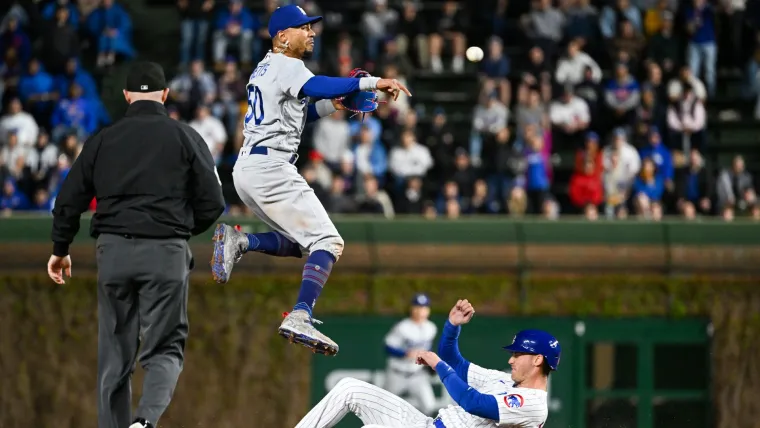Braves vs. Dodgers: A Comprehensive Position-by-Position Breakdown of MLB Superteams
In the realm of the National League, the Braves and Dodgers stand out as the premier teams on paper. However, as the saying goes, championships aren’t won on paper, and both teams fell short of the NLCS in 2023. Motivated by their postseason setbacks, both clubs have embarked on active and costly offseasons, augmenting already formidable rosters that reached triple-digit wins in the previous season.

The Braves have been active in trade discussions, while the Dodgers have been generous with substantial contracts, with both front-office leaders, Andrew Friedman and Alex Anthopoulos, likely not done shaping their final Opening Day rosters.
To gauge which team is currently superior on paper, a detailed position-by-position analysis is in order.
First Base:
- Dodgers: Freddie Freeman
- Braves: Matt Olson
In a deadlock, neither team is given an advantage at first base. Freeman and Olson, both elite players, had exceptional performances in the previous season, making them the two best first basemen in the league. The NL MVP voting reflected their closeness, with Freeman finishing third and Olson fourth, separated by a mere four points.
Advantage, nobody: No cop-outs promised for the remaining positions.
Second Base:
- Dodgers: Mookie Betts
- Braves: Ozzie Albies
While Betts’ stay at second base might not last the entire season, his elite skills currently give the Dodgers the advantage. Albies is recognized for his prowess but falls short in this head-to-head comparison.
Advantage, Dodgers: Betts stands out, but second base remains a strength for Atlanta.
Shortstop:
- Dodgers: Gavin Lux
- Braves: Orlando Arcia
Shortstop is a potential concern for both teams. Arcia had a promising start for the Braves but faced challenges later in the season. Lux, returning from injury, brings uncertainties to the Dodgers’ shortstop position.
Advantage, Braves: Lux’s upside is countered by Arcia’s stability.
Third Base:
- Dodgers: Max Muncy
- Braves: Austin Riley
Riley’s elite performance at third base, both defensively and offensively, gives the Braves a significant advantage. Muncy’s power is acknowledged, but defensive concerns raise questions.
Advantage, Braves: One of the most substantial advantages for either team.
Catcher:
- Dodgers: Will Smith
- Braves: Sean Murphy/Travis d’Arnaud
Smith is recognized among the best catchers, but the Braves boast a strong tandem with Murphy and d’Arnaud, providing both offensive and defensive prowess.
Advantage, Braves: The Murphy/d’Arnaud combination matches up favorably against Smith.
Outfield:
- Dodgers: James Outman, Teoscar Hernandez, Jason Heyward
- Braves: Ronald Acuña Jr., Michael Harris II, Jarred Kelenic
With Acuña possibly the best player in the sport, the Braves have a considerable advantage in the outfield. Questions surround the Dodgers’ outfield, with Hernandez’s strikeout numbers and Heyward’s consistency being concerns.
Advantage, Braves: A substantial advantage in the outfield.
Designated Hitter:
- Dodgers: Shohei Ohtani
- Braves: Marcell Ozuna
While Ozuna exceeded expectations, Ohtani’s unique skills give the Dodgers a clear advantage in the designated hitter position.
Advantage, Dodgers: Ohtani’s exceptional abilities make this an easy choice.
Bench:
- Dodgers: Austin Barnes, Miguel Rojas, Chris Taylor, Manuel Margot
- Braves: David Fletcher, Luis Guillorme, Forrest Wall, Andrew Velazquez
With a limited pop on both benches, the Dodgers gain a slight advantage due to Chris Taylor’s ability to fill in at multiple positions.
Advantage, Dodgers: Taylor’s versatility tips the scale for the Dodgers.
Rotation:
- Dodgers: Yoshinobu Yamamoto, Tyler Glasnow, Walker Buehler, Bobby Miller, Emmet Sheehan
- Braves: Spencer Strider, Max Fried, Charlie Morton, Chris Sale, Bryce Elder
The Braves hold a slight advantage in rotation certainty, with Strider, Morton, and Elder demonstrating consistency. The Dodgers, with an abundance of swing-and-miss pitchers, have more uncertainties.
Advantage, Braves: Atlanta’s rotation seems better equipped for the 162-game schedule, but health considerations may favor the Dodgers’ top four come October.
Setup/Closer Roles:
- Dodgers: Evan Phillips, Brusdar Graterol, J.P. Feyereisen
- Braves: Raisel Iglesias, A.J. Minter, Tyler Matzek
Neither team boasts a lights-out closer, and both are linked to Josh Hader. The Dodgers, with Evan Phillips, have a potential advantage, especially if Feyereisen returns effectively.
Advantage, Dodgers: Not a significant difference; Feyereisen’s potential impact is noteworthy.
Manager:
- Dodgers: Dave Roberts
- Braves: Brian Snitker
Both Roberts and Snitker bring World Series titles to their respective teams, but both have faced criticism for postseason decisions. Snitker gains a slight edge.
Advantage, Braves: Both managers are assets, but Snitker holds a slight advantage.
Overall Advantage: Braves
In assessing these formidable teams, the difference lies in their weakest links. The Braves, with fewer weaknesses, gain the overall advantage. While both teams are likely to reach triple-digit wins, the Braves’ more stable roster gives them the nod over the Dodgers, who, despite significant spending, exhibit more areas of need.
Note: The article closes by emphasizing that both teams are exceptional and capable of surpassing 100 wins unless unforeseen calamities occur.
